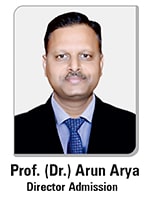

PEOs are broad statements that describe the career and professional accomplishments that the program is preparing its graduates to accomplish. These objectives were developed, refined and finalized using the inputs from various constituencies such as the academic experts, staff of Computer Science Engineering department, Alumni of the college working in field and various industries visiting the college for on campus placement beside the country basic need for human resources in the field of Computer Engineering.
PEO I: The graduates of the Program will have solid foundation in the principles and practices of computer science, including mathematics, science and basic engineering.
PEO II: The graduates of the Program will have skills to function as members of multidisciplinary teams and to communicate effectively using modern tools.
PEO III: The graduates of the Program will be prepared for their careers in the software industry or pursue higher studies and continue to develop their professional knowledge.
PEO IV: The graduates of the program will practice the profession with ethics, integrity, leadership and social responsibility.
Program Outcomes are the abilities of the student at the end of the program. It is expected that our student will have following abilities after completing 4 years program B.Tech. in CSE.
PO1. Engineering knowledge: Apply the knowledge of mathematics, science, engineering fundamentals, and an engineering specialization to the solution of complex engineering problems.
PO2. Problem analysis: Identify, formulate, review research literature, and analyze complex engineering problems reaching substantiated conclusions using first principles of mathematics, natural sciences, and engineering sciences.
PO3. Design/development of solutions: Design solutions for complex engineering problems and design system components or processes that meet the specified needs with appropriate consideration for the public health and safety, and the cultural, societal, and environmental considerations.
PO4. Conduct investigations of complex problems: Use research-based knowledge and research methods including design of experiments, analysis and interpretation of data, and synthesis of the information to provide valid conclusions.
PO5. Modern tool usage: Create, select, and apply appropriate techniques, resources, and modern engineering and IT tools including prediction and modeling to complex engineering activities with an understanding of the limitations.
PO6. The engineer and society: Apply reasoning informed by the contextual knowledge to assess societal, health, safety, legal and cultural issues and the consequent responsibilities relevant to the professional engineering practice.
PO7. Environment and sustainability: Understand the impact of the professional engineering solutions in societal and environmental contexts, and demonstrate the knowledge of, and need for sustainable development.
PO8. Ethics: Apply ethical principles and commit to professional ethics and responsibilities and norms of the engineering practice.
PO9. Individual and team work: Function effectively as an individual, and as a member or leader in diverse teams, and in multidisciplinary settings.
PO10. Communication: Communicate effectively on complex engineering activities with the engineering community and with society at large, such as, being able to comprehend and write effective reports and design documentation, make effective presentations, and give and receive clear instructions.
PO11. Project management and finance: Demonstrate knowledge and understanding of the engineering and management principles and apply these to one’s own work, as a member and leader in a team, to manage projects and in multidisciplinary environments.
PO12. Life-long learning: Recognize the need for, and have the preparation and ability to engage in independent and life-long learning in the broadest context of technological change.
The department of Computer Science and Engineering has defined the following Program Specific Outcomes.
PSO1: Students are able to model, design and implement Software and hardware communication network systems using knowledge of modern tools and techniques to serve the society as professional Computer Engineers.
PSO2: Students are able to develop software engineering system of varying complexity and Innovative products in emerging areas of Computer Engineering.









